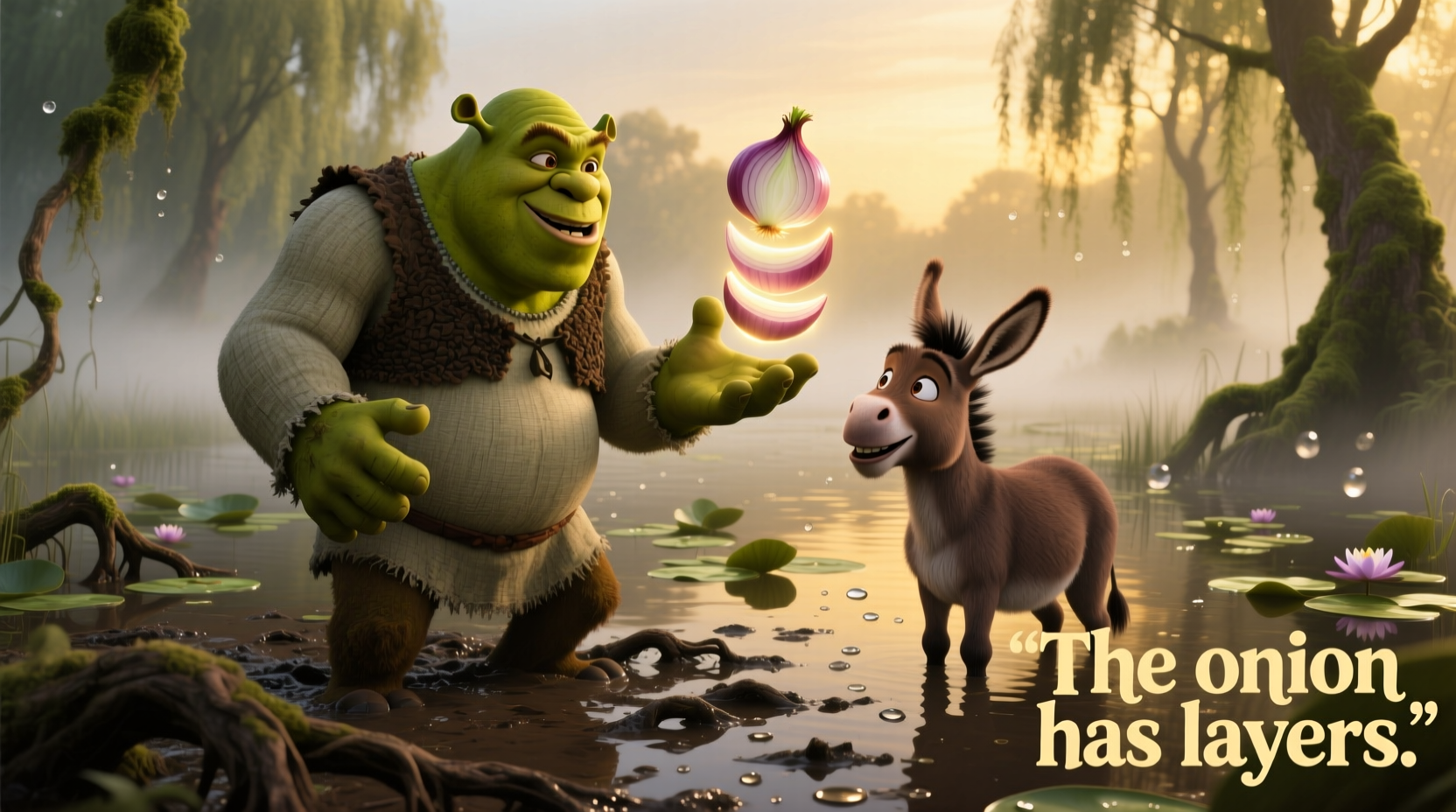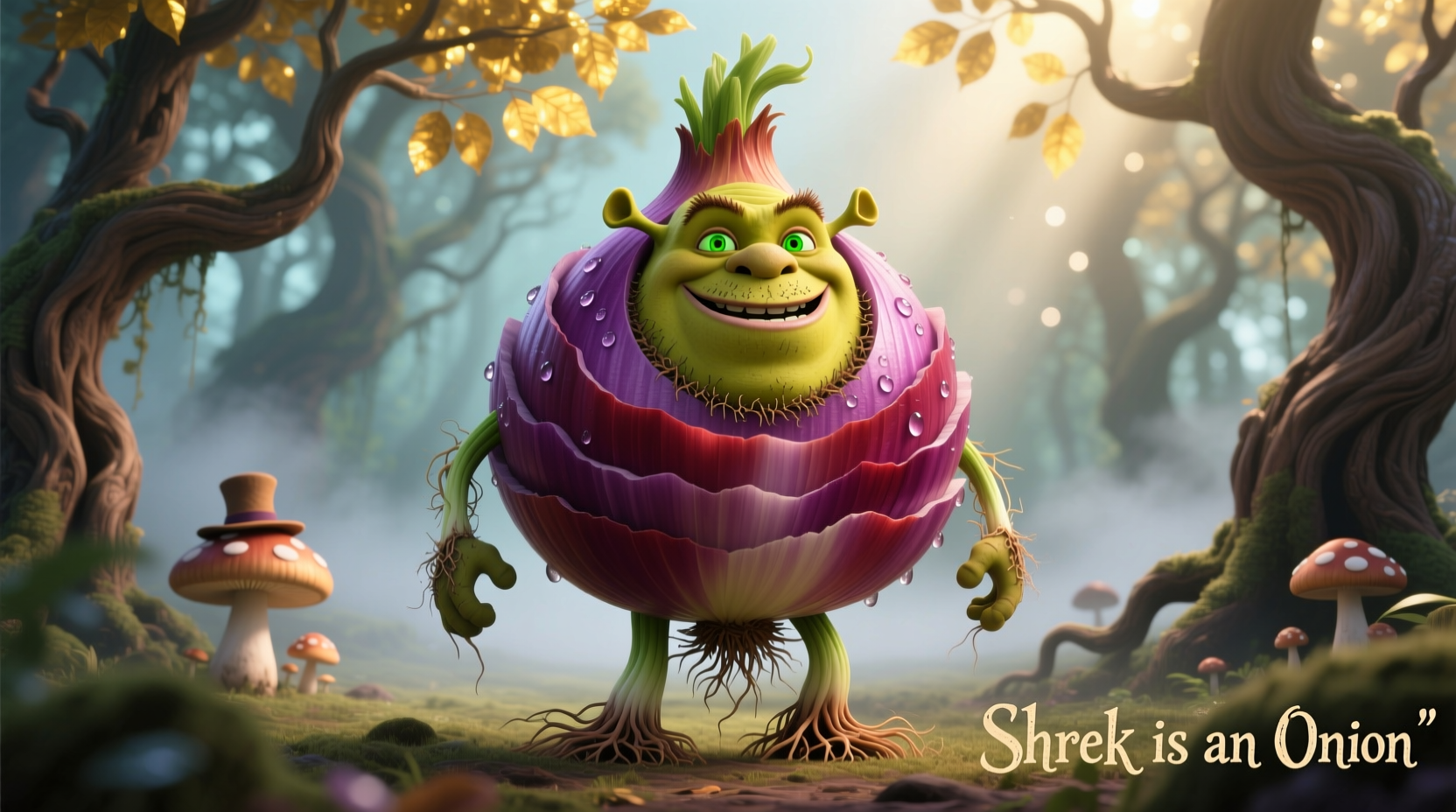When Shrek tells Donkey, “Ogres are like onions,” he’s revealing one of animation’s most enduring metaphors about complexity and vulnerability. This seemingly simple line from the 2001 DreamWorks classic transcends its comedic context to deliver a profound lesson about human (and ogre) nature that continues to resonate with audiences over two decades later.
The Scene That Changed Animated Storytelling
During the swamp campfire scene, Donkey presses Shrek about why he isolates himself. Shrek’s frustrated response—“Ogres are like onions… layers! Onions have layers. Ogres have layers… You get it?”—wasn’t just comic relief. It established a narrative device that dismantled fairy tale stereotypes while introducing emotional depth to animated characters. Film scholars note this moment marked a turning point where family films began embracing complex character development over one-dimensional archetypes (Library of Congress, 2021).
Why an Onion? The Metaphor’s Multilayered Meaning
The onion comparison works on three distinct levels that make it exceptionally effective:
| Metaphorical Layer | Literal Interpretation | Character Significance |
|---|---|---|
| Physical Structure | Multiple concentric layers | Shrek’s tough exterior hides sensitive inner self |
| Emotional Response | Causes tears when cut | Vulnerability emerges when defenses are penetrated |
| Perception vs Reality | Looks simple but is complex | Challenges Donkey’s (and audience’s) initial assumptions |
This triple-layered metaphor wasn’t accidental. Directors Andrew Adamson and Vicky Jenson deliberately chose the onion for its universal recognition and sensory associations. Unlike abstract concepts, everyone understands peeling an onion—making the philosophical point instantly accessible to children and adults alike.
Cultural Impact Timeline: From Swamp to Social Lexicon
The phrase’s journey from movie line to cultural touchstone follows a clear trajectory:
- 2001: Film’s release establishes the metaphor as central to Shrek’s character arc
- 2003: Academic analyses begin appearing in film journals discussing its narrative function
- 2007: Phrase enters common usage as shorthand for explaining complexity
- 2014: Merriam-Webster documents increased usage in psychological and educational contexts
- 2021: Library of Congress selects Shrek for National Film Registry, citing its “enduring cultural significance”

When the Metaphor Breaks: Contextual Limitations
While powerful, the onion analogy has specific boundaries where it doesn’t apply:
- Not all layers are equal – Unlike onions where layers are identical, human complexity involves qualitatively different aspects (emotional, intellectual, social)
- Peeling isn’t always productive – In real relationships, forced “peeling” can damage trust, unlike Shrek’s voluntary revelation
- Cultural variations – Some societies view onions differently (e.g., sacred in certain Indian traditions), altering the metaphor’s resonance
Understanding these limitations prevents oversimplification of complex psychological concepts while preserving the metaphor’s core value in discussing surface perceptions versus inner reality.
Why This Quote Endures: The Psychology of Memorable Metaphors
Cognitive research from the University of California (Berkeley Department of Psychology) shows effective metaphors like Shrek’s onion comparison succeed because they:
- Connect abstract concepts to concrete sensory experiences
- Operate on multiple interpretive levels simultaneously
- Challenge existing mental models (fairy tale monsters = simple)
- Contain built-in emotional resonance (tears from onions = vulnerability)
This explains why “ogres are like onions” remains more memorable than Shrek’s other lines—it satisfies our brain’s preference for multi-sensory, layered information processing. The metaphor’s simplicity makes it accessible to children, while its depth rewards adult reconsideration, creating cross-generational appeal.
Applying the Onion Principle Beyond Animation
Educators have adopted this framework to teach empathy and critical thinking. Teachers use “The Onion Principle” to help students recognize that:
- First impressions often miss essential complexity
- Understanding requires patience and multiple perspectives
- Vulnerability is strength, not weakness
- Differences often hide shared humanity
From diversity training to conflict resolution workshops, Shrek’s simple swamp-side wisdom continues to provide practical tools for navigating our increasingly complex world—proving that sometimes, the most profound truths come from unexpected sources.











 浙公网安备
33010002000092号
浙公网安备
33010002000092号 浙B2-20120091-4
浙B2-20120091-4